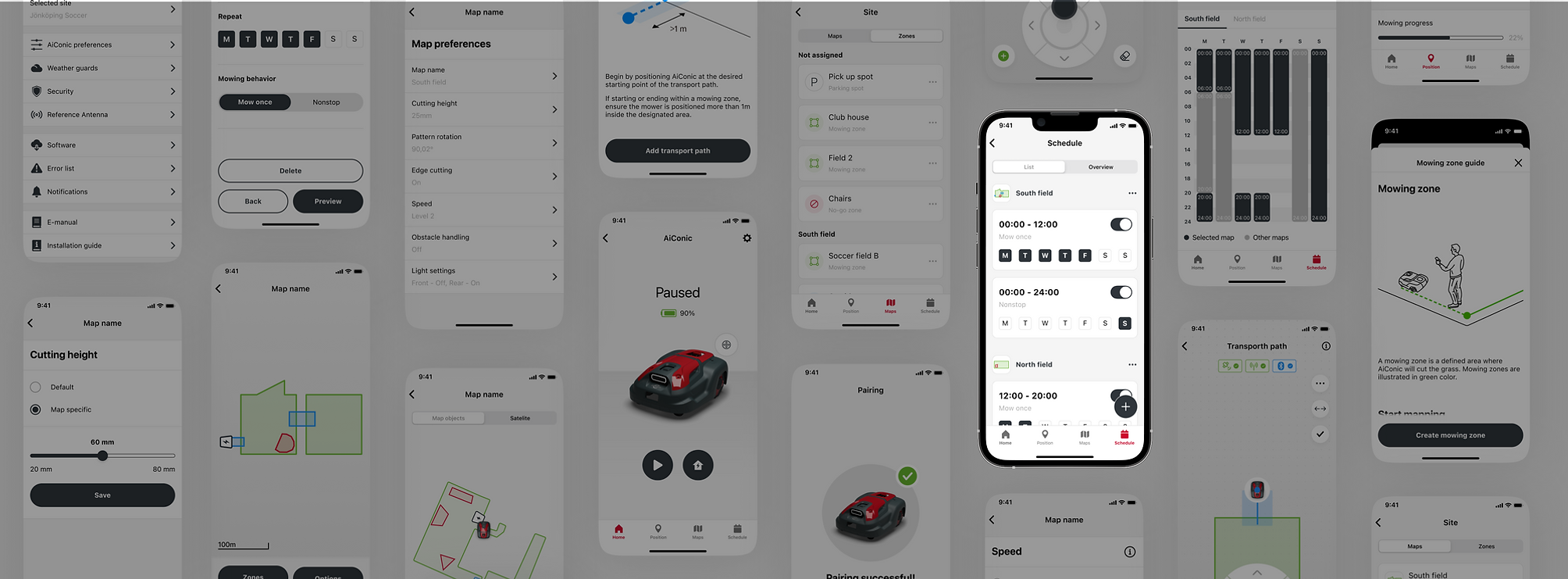
AiConic App
UI/UX project for App, including component library
I co-led the UI/UX design for our company’s first RTK-enabled robotic lawn mower. We delivered 500+ screens and 50+ components, adapting for both iOS and Android. I combined design leadership, cross-team coordination, and user-centered problem-solving to create a smooth and intuitive experience for a complex product.
Software
Figma, Jira, Illustrator
Duration
5 months
Delivery
500+ screens, component library
Team
2 UI & UX designers, 5 Developers, 2 Testers etc.
My Role
UI & UX Designer
This was our company’s first step into advanced RTK technology for robotic lawn mowers. The lead UI designer left unexpectedly, and my colleague and I stepped in to take full responsibility for the UI design at a late stage.
We were tasked with creating the complete interface for our first RTK robotic lawn mower, working with a brand-new native iOS and Android development team. Simultaneously, we built a scalable component library with 50+ components while producing over 500 UI screens.
Our role extended beyond design — we facilitated workshops, mediated between departments, and ensured the design direction was consistent and technically feasible, all while meeting tight deadlines.
Project Brief
Result
500+ screens

50+ added components

The result was a fully realized UI design system, tailored for both iOS and Android, supporting a seamless and intuitive user experience for a highly technical product.
-
500+ unique screens designed, documented, and delivered
-
50+ reusable components created, forming the foundation of our company’s future design system
Challenging UI
Designing for a highly technical product like a robotic lawn mower required several unique and complex UI solutions. Two examples that challenged us as UI designers — and taught me a lot — were the Scheduling UI and the Installation Guide UI.

Schedule
Designing the scheduling feature was a complex challenge. We explored multiple interaction patterns from a user perspective, balancing simplicity with flexibility. At the same time, the back-end logic was still under development, requiring close collaboration with developers to determine technical feasibility.
Our UI team acted as a central hub, leading cross-departmental workshops to ideate, validate, and refine solutions.
This work refined my ability to turn complex systems into intuitive, consistent experiences — finding the most user-friendly solution through exploration and collaboration.
Installation Guide
For the installation guide, clarity and ease of use were critical. The robotic mower’s installation is complex, so the interface needed to make the process feel approachable.

I refined the existing illustrations to make them cleaner, and easier to understand. By introducing a clear color-coding system, I improved usability and helped users quickly grasp important details. Additionally, I thoroughly reworked the instructional text to simplify complex steps and enhance clarity. The result is a user-friendly guide that transforms a potentially overwhelming installation into a manageable, step-by-step process.
Through this work, I strengthened my skills in visual communication and in transforming complex installations into clear, approachable steps — making the process feel achievable for every user.

Process
My colleague and I joined the project late, after the original lead designer left unexpectedly. Our task was to refresh the existing UI while transitioning the app to native iOS and Android development. Much of the design was still unfinished, and we worked closely with the engineers building the robot to generate ideas and clarify requirements.
To compensate for limited user testing time due to the tight schedule, we built prototypes and conducted informal A/B tests with friends and colleagues. These rapid iteration cycles helped ensure the UI was user-friendly, technically feasible, and aligned with the development timeline, through close collaboration across teams.
Throughout the process, prototyping and iterative testing played a key role in overcoming challenges such as the complex scheduling feature and the detailed installation guide.


